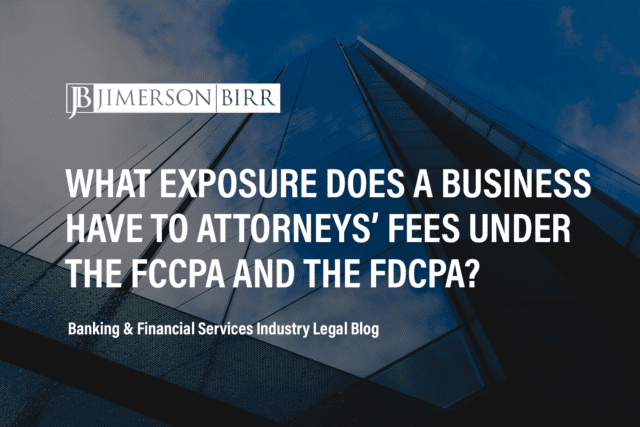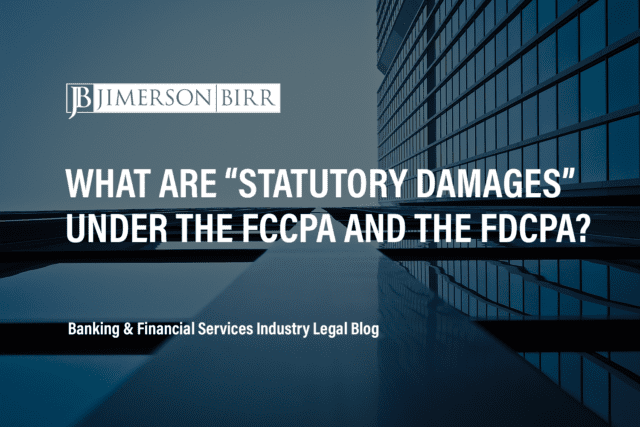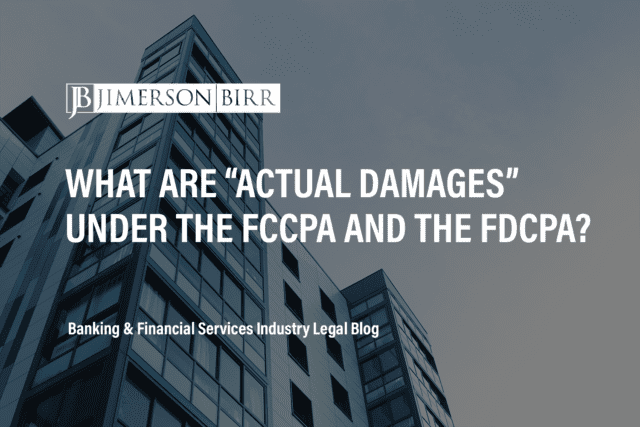What do challenging allegations and limiting exposure for damages entail?
Challenging allegations and limiting exposure for damages in Fair Debt Collection Practices Act (FDCPA) defense litigation involve disputing the claims made by a debtor and minimizing the potential financial consequences a debt collector might face. In Florida, this process follows federal and state laws.
For instance, a debt collector might challenge the validity of an alleged FDCPA violation by questioning the debtor’s characterization of their conduct. Under the FDCPA, debt collectors cannot engage in abusive, deceptive, or unfair practices when attempting to collect a debt. A debt collector might argue that their actions did not violate the FDCPA’s provisions and provide evidence to support their argument
In addition to federal law, Florida has its own Florida Consumer Collection Practices Act (FCCPA) that provides additional protections for debtors. To challenge allegations and limit exposure for damages under the FCCPA, a debt collector might argue that their conduct complied with the state law’s requirements.
Need help defending against a class action? Schedule your consultation today with a top class action litigation defense attorney.
What are the strategic benefits of challenging allegations and limiting exposure for damages?
Challenging allegations and limiting exposure for damages offers the following strategic benefits:
- Avoiding costly litigation: By effectively challenging the validity of a debtor’s claims early in the process, debt collectors can potentially resolve the dispute without needing a full-blown trial.
- Protecting the collector’s reputation: Successfully defending against FDCPA claims can help maintain the debt collector’s image, as excessive fines or adverse judgments may tarnish their reputation in the industry.
- Preserving business relationships: Demonstrating compliance with the FDCPA and FCCPA can help debt collectors maintain good relationships with clients who entrust them with collecting their debts.
- Minimizing damages and penalties: Challenging allegations and limiting exposure for damages can help debt collectors reduce the amount of statutory damages, actual damages, and attorney’s fees they may be liable for under the FDCPA and FCCPA.
What steps can class action defendants take to challenge allegations and limit exposure for damages?
Defense counsel should consider the following:
- Conduct a thorough investigation: Review the debtor’s claims and the debt collector’s actions to identify factual inaccuracies or misrepresentations. Gather supporting documentation, such as correspondence, call recordings, and internal policies, to counter the allegations.
- Assert affirmative defenses: Identify applicable affirmative defenses, such as the bona fide error defense, which may absolve the debt collector from liability if they can prove the violation resulted from a clerical, factual, or legal mistake despite maintaining procedures to avoid such errors.
- Challenge the debtor’s standing: Ensure that the debtor has legal standing to bring the FDCPA claim by confirming they are a “consumer” as defined by the Act and that the debt in question qualifies as a “debt” under the statute.
- Assert statute of limitations: As the FDCPA imposes a one-year statute of limitations, verify the timeliness of the claim and argue for dismissal if the claim is time-barred.
- Negotiate a settlement: Explore settlement options with the debtor to resolve the dispute amicably and reduce the potential for significant damage awards.
When a set of facts is appropriate to meet the litigation requirements, there are many paths a claimant may take. We are value-based attorneys at Jimerson Birr, which means we look at each action with our clients from the point of view of costs and benefits while reducing liability. Then, based on our client’s objectives, we chart a path to seek appropriate remedies.
To determine whether your unique situation may necessitate litigation, please contact our office to set up your initial consultation.
Frequently Asked Questions
- Can a debt collector continue collection efforts while an FDCPA lawsuit is pending?
Yes, debt collectors can continue collection efforts while an FDCPA lawsuit is pending, but they must do so in compliance with the FDCPA and the FCCPA. However, it’s important to note that any further violations during the litigation could worsen the situation and potentially increase the damages awarded to the consumer.
- What types of communication are prohibited under the FDCPA and FCCPA?
The FDCPA and FCCPA prohibit certain types of communication by debt collectors, including but not limited to:
- Communicating with a consumer at inconvenient times or places, such as before 8:00 AM or after 9:00 PM, unless the consumer has agreed to such communication.
- Contacting a consumer who an attorney represents.
- Contacting a consumer at their workplace if the debt collector knows or has reason to know that the employer prohibits such communication.
- Using false, deceptive, or misleading representations in connection with debt collection.
- Can a consumer recover attorney’s fees if they prevail in an FDCPA lawsuit?
Yes, under the FDCPA and FCCPA, a consumer who prevails in a lawsuit may recover reasonable attorney’s fees and costs from the debt collector. This provision incentivizes consumers to assert their rights under the Acts. In addition, it encourages debt collectors to comply with the law to avoid the potential expense of attorney’s fees and damages.
Have more questions about a class action defense-related situation?
Crucially, this overview of challenging allegations and limiting exposure for damages does not begin to cover all the laws implicated by this issue or the factors that may compel the application of such laws. Every case is unique, and the laws can produce different outcomes depending on the individual circumstances.
Jimerson Birr attorneys guide our clients to help make informed decisions while ensuring their rights are respected and protected. Our lawyers are highly trained and experienced in the nuances of the law, so they can accurately interpret statutes and case law and holistically prepare individuals or companies for their legal endeavors. Through this intense personal investment and advocacy, our lawyers will help resolve the issue’s complicated legal problems efficiently and effectively.
Having a Jimerson Birr attorney on your side means securing a team of seasoned, multi-dimensional, cross-functional legal professionals. Whether it is a transaction, an operational issue, a regulatory challenge, or a contested legal predicament that may require court intervention, we remain a tireless advocate every step of the way. Being a value-added law firm means putting the client at the forefront of everything we do. We use our experience to help our clients navigate even the most complex problems and come out the other side triumphant.
If you want to understand your case, the merits of your claim or defense, potential monetary awards, or the amount of exposure you face, you should speak with a qualified Jimerson Birr lawyer. Our experienced team of attorneys is here to help. Call Jimerson Birr at (904) 389-0050 or use the contact form to set up a consultation.

We live by our 7 Superior Service Commitments
- Conferring Client-Defined Value
- Efficient and Cost-Effective
- Accessibility
- Delivering an Experience While Delivering Results
- Meaningful and Enduring Partnership
- Exceptional Communication Based Upon Listening
- Accountability to Goals











